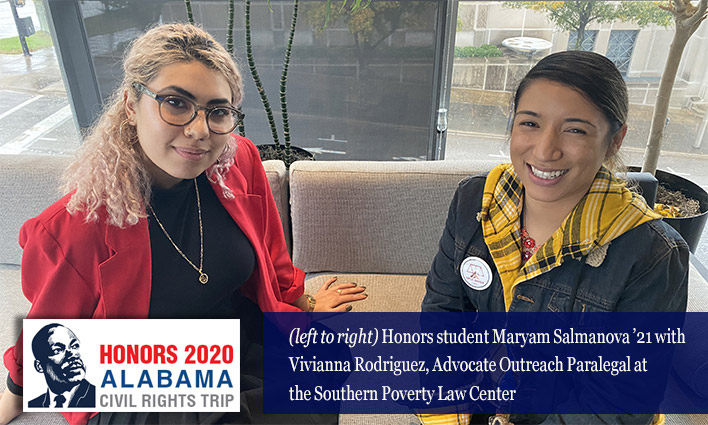
An inspiring voice during our 2020 Honors Alabama Civil Rights trip was that of the Southern Poverty Law Center (SPLC) Advocate Outreach Paralegal Vivianna Rodriguez. As she spoke about her efforts to help the immigrant community in Alabama, Maryam Salmanova ’21, an English and Economics major, frequently nodded her head and asked thoughtful questions. Rodriguez explained to the group that in Alabama, immigrants are highly targeted when they’re driving. Having undocumented parents herself, Rodriguez described the painful repercussions that these actions have on the immigrant community. Salmanova, an immigrant from Azerbaijan, felt a connection to Rodriguez because her close family friend is currently struggling with undocumented status. Senior Editor/Writer, Andrea Clark, sat down with Rodriguez and Salmanova to learn more about their thoughts on immigrant rights and the links the issue has to the civil rights movement.

“In Alabama we have a rep for discrimination against minorities, and right now our immigrant community is being highly targeted for driving.” —Vivianna Rodriguez, SPLC
Clark: Can you tell us a little bit about your backgrounds?
Salmanova: My family and I moved here from Azerbaijan when I was five years old. Education has always been central to unlocking what can be done, and my parents always stressed that anything can be taken away from you, except for your education and your understanding of the world. I’ve made it my life’s journey to really understand where I come from, why I am the way that I am, and how I can use my own strengths to empower other communities and people who might have a similar or different walk of life.
Rodriguez: I’m a first-generation college student, and my parents are from Mexico. They’re undocumented immigrants, and it’s specifically because of my background and my parents that I’m so passionate about immigrant activism.
Clark: Can you tell us about the work you’re doing to help immigrants in your respective communities?
Rodriguez: Unfortunately, in Alabama we have a rep for discrimination against minorities, and right now our immigrant community is being highly targeted for driving. Alabama HB 56 did make it unlawful for law enforcement to profile people who may look like an immigrant to ask them for their documentation, but because of bigotry, and depending on what county you’re in, local law enforcement can take their own measures and go their own way when enforcing laws. This is particularly true in Baldwin County. It’s a very agriculturally driven community, and it’s where a lot of the immigrants that live in the surrounding counties have to travel to for work. They are targeted on their way to work, and on their way home. Here at the Southern Poverty Law Center, we’re going to conduct a police misconduct listening tour. We’re hoping to get stories from people that may have a potential claim. We’re also hoping to work with the Immigrant Justice Project team, who will be focusing on law officials acting as ICE officials—which they’re not supposed to be doing. That’s a big issue that’s going on right now in the entire state of Alabama.
Salmanova: Right now I’m in the middle of trying to help someone who is very close to me get through the immigration process. This person is a minor who moved here from Turkey, and they’re undocumented. It’s been frustrating because the juvenile process is very difficult. The court has a docket that’s backed up for years, and there are all these bureaucratic ways to hold people back, meanwhile time is ticking away while this young person is losing opportunities. Despite it being frustrating, I’m grateful that I’m in New York City. I don’t think it’s as stringent as it is here in Alabama, and in New York there are safe spaces where I can talk about this frustration freely.
Clark: What links do you see between the fight for immigrant rights and the civil rights movement that we’ve been studying on this trip?
Rodriguez: It’s not simple, but both the issues are civil rights issues. The African-American community immediately identified the parallels, and they were one of the first advocates for immigrants in Alabama. There are not a lot of grassroots organizations that are willing to fight for immigrants’ rights in the state of Alabama, but the African-American community put their money where their mouth is. The Alabama Coalition for Immigrant Justice (ACIJ) was the only statewide organization that advocated for immigrant rights, and the National Association for the Advancement of Colored People (NAACP) was one of the first advocate groups standing by them. They identified with immigrants and saw a similar struggle.

“I think at the core of this trip is the understanding that you have to know and fight for your rights.” —Maryam Salmanova
Salmanova: I think at the core of this trip is the understanding that you have to know and fight for your rights. And, you have to understand and be conscious of when you are being denied those rights. You also have to be conscious that there’s a legacy that proceeded what you’re facing now. I think that’s the intersection with what African-Americans felt in Alabama during the civil rights movement and with what immigrants are feeling today. Both groups were denied their rights out of a legacy of oppression.
- Honors 2020 Alabama Civil Rights Trip: Pre-Trip Excitement and Expectations
- Honors 2020 Alabama Civil Rights Trip: Exploring Selma
- Honors 2020 Alabama Civil Rights Trip: A Conversation with John Jay President Karol V. Mason
- Honors 2020 Alabama Civil Rights Trip: An Introspective Essay From Denny T. Boodha ’22
- Honors 2020 Alabama Civil Rights Trip: A Reflective Poem From Isaac Paredes ’21
-
Honors 2020 Alabama Civil Rights Trip: Acknowledging Sadness and Anger



